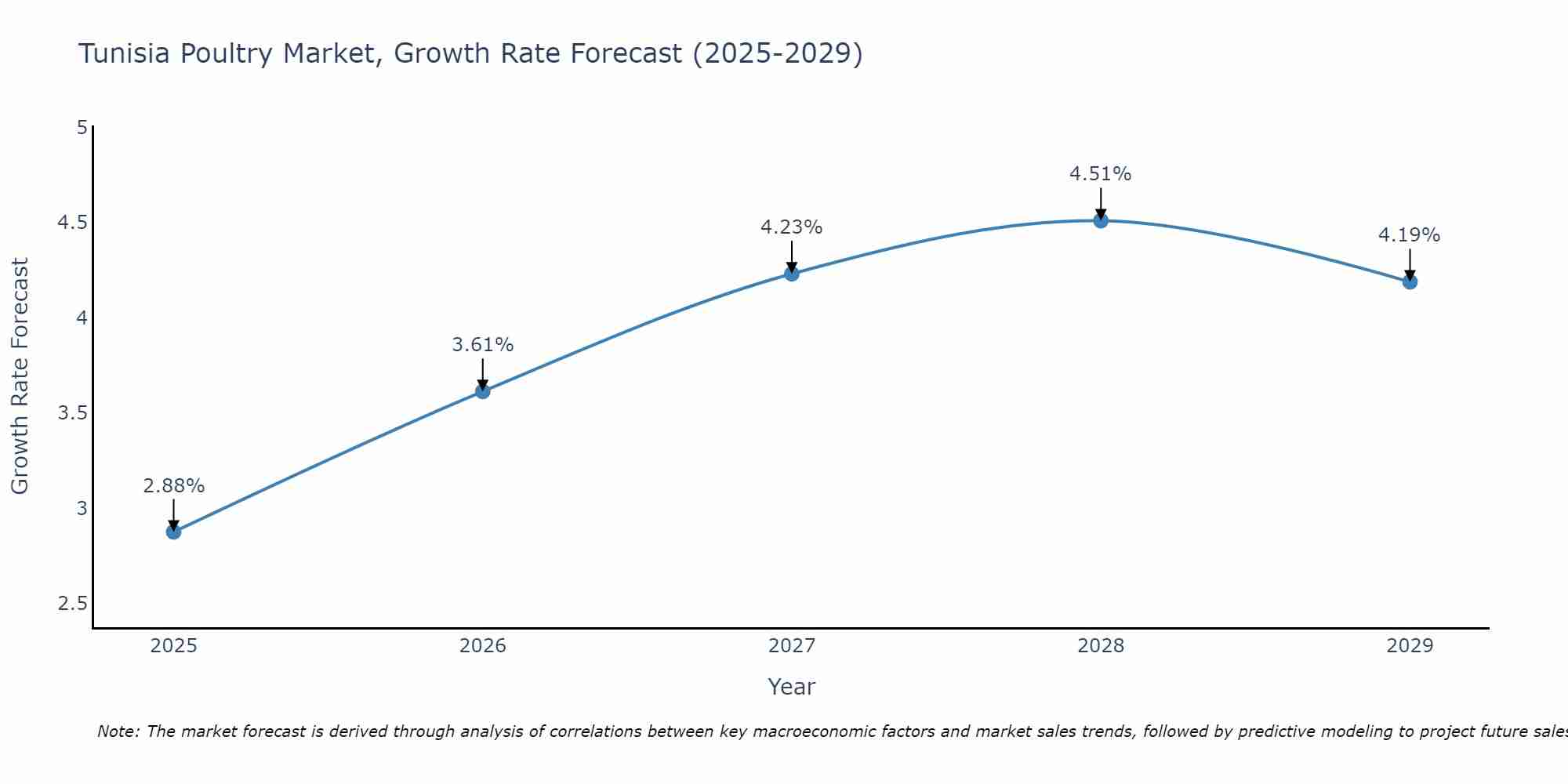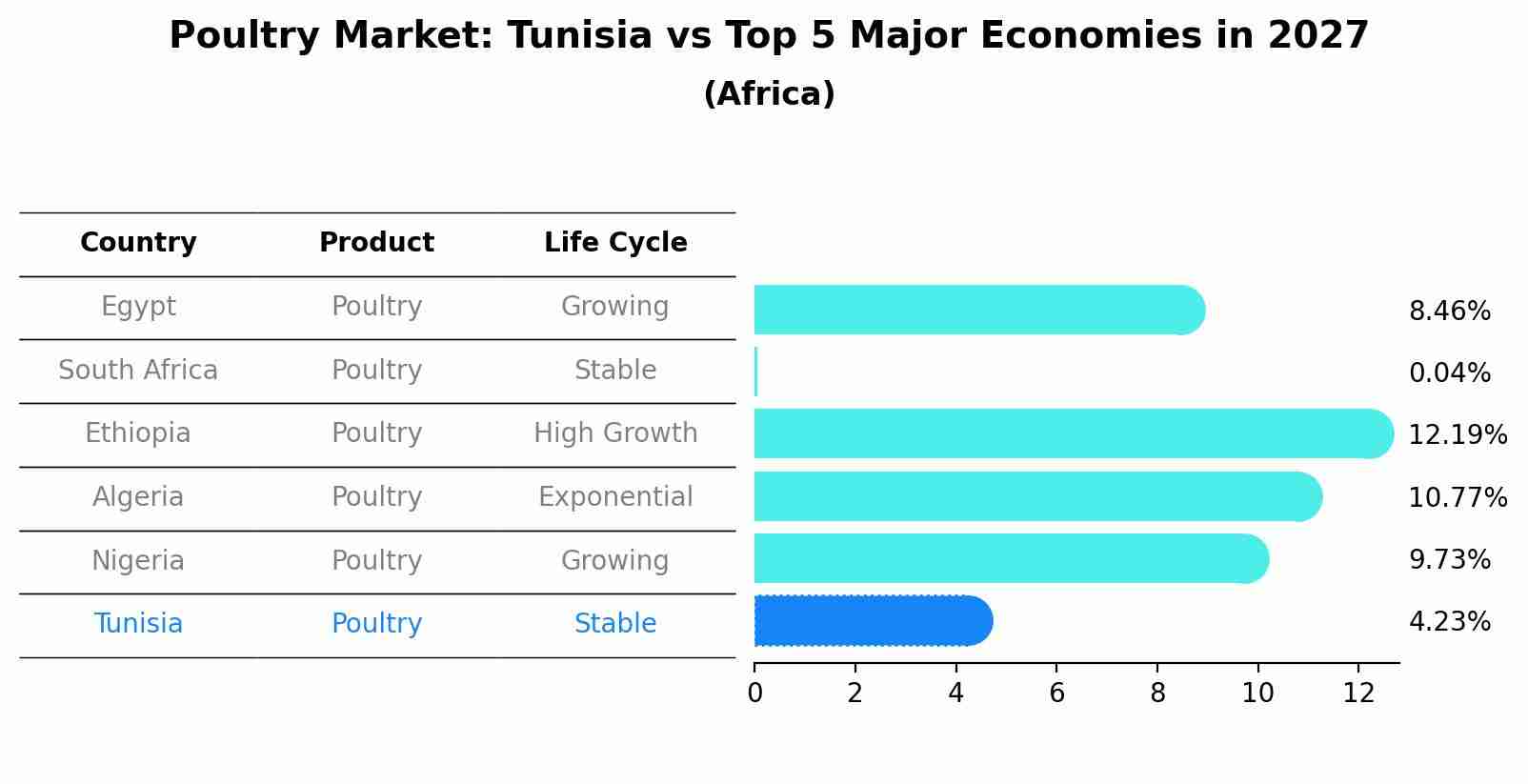Tunisia Poultry Market Outlook | Trends, Industry, Forecast, Revenue, Growth, Companies, Size, Analysis, Value, COVID-19 IMPACT & Share
| Product Code: ETC384234 | Publication Date: Aug 2022 | Updated Date: Jul 2025 | Product Type: Market Research Report | |
| Publisher: 6Wresearch | Author: Ravi Bhandari | No. of Pages: 75 | No. of Figures: 35 | No. of Tables: 20 |
Tunisia Poultry Market Size Growth Rate
The Tunisia Poultry Market is projected to witness mixed growth rate patterns during 2025 to 2029. The growth rate begins at 2.88% in 2025, climbs to a high of 4.51% in 2028, and moderates to 4.19% by 2029.

Poultry Market: Tunisia vs Top 5 Major Economies in 2027 (Africa)
The Poultry market in Tunisia is projected to grow at a stable growth rate of 4.23% by 2027, highlighting the country's increasing focus on advanced technologies within the Africa region, where Egypt holds the dominant position, followed closely by South Africa, Ethiopia, Algeria and Nigeria, shaping overall regional demand.

Tunisia Poultry Market Synopsis
The Tunisia poultry market is experiencing steady growth driven by increasing consumer demand for poultry products. Poultry consumption in Tunisia has been on the rise due to factors such as population growth, urbanization, and changing dietary habits. The market is characterized by a mix of domestic producers and imports to meet the growing demand. Local poultry farms play a significant role in supplying the market, while imports, particularly from Europe, cater to the demand for specific products and breeds. Key players in the Tunisia poultry market include companies such as Soviba, Nutrifood, and Avigrain, among others. The market is also influenced by factors such as government regulations, health standards, and consumer preferences, which are shaping the competitive landscape and driving innovation in the sector.
Tunisia Poultry Market Trends
The Tunisia poultry market is experiencing a shift towards more sustainable and ethically sourced products, driven by increasing consumer awareness and concerns about animal welfare and environmental impact. There is a growing demand for organic and free-range poultry products, with consumers willing to pay a premium for higher quality and more responsibly produced options. Additionally, convenience and ready-to-eat poultry products are gaining popularity, catering to busy lifestyles and the need for quick and easy meal solutions. The market is also seeing a rise in online sales and delivery services for poultry products, providing consumers with more convenient ways to purchase their preferred products. Overall, the Tunisia poultry market is evolving to meet changing consumer preferences towards healthier, more sustainable, and convenient poultry options.
Tunisia Poultry Market Challenges
In the Tunisia poultry market, challenges include fluctuations in feed prices, disease outbreaks, and increasing competition. Fluctuations in feed prices directly impact production costs for poultry farmers, leading to potential fluctuations in prices for consumers. Disease outbreaks, such as avian influenza, can result in significant losses for poultry producers and affect consumer confidence in the safety of poultry products. Additionally, the market is becoming more competitive with the presence of both domestic and imported poultry products, putting pressure on local producers to maintain quality and pricing competitiveness. Overall, navigating these challenges requires effective risk management strategies, investment in biosecurity measures, and continuous efforts to enhance product quality and differentiate offerings in the market.
Tunisia Poultry Market Investment Opportunities
Investment opportunities in the Tunisia Poultry Market include vertical integration of the supply chain, such as investing in poultry farms, hatcheries, feed production, and processing facilities to capture a larger share of the market. Additionally, there is potential for introducing innovative technologies for poultry farming to improve efficiency and reduce costs. With the growing demand for poultry products in Tunisia due to increasing population and changing dietary preferences, there is also an opportunity to expand distribution channels and develop new products to meet consumer needs. Investing in sustainable and organic poultry farming practices could also appeal to a niche market segment. Overall, the Tunisia Poultry Market offers diverse opportunities for investors looking to capitalize on the country`s evolving food industry.
Jordan Agar Market Government Policies
Government policies related to the Tunisia Poultry Market include regulations on production, importation, and pricing to ensure food safety standards are met. The Tunisian government has implemented measures to support domestic poultry production, such as subsidies for feed and investments in modern farming techniques. Import restrictions and tariffs are in place to protect local producers from foreign competition, while also promoting self-sufficiency in poultry production. Additionally, the government monitors pricing to prevent price manipulation and ensure fair competition in the market. These policies aim to maintain a stable and competitive poultry market in Tunisia, balancing the needs of consumers, producers, and the overall economy.
Tunisia Poultry Market Future Outlook
The future outlook for the Tunisia Poultry Market appears promising, driven by factors such as increasing consumer demand for protein-rich foods, population growth, and rising income levels. The industry is likely to witness continued growth and expansion as poultry remains a staple in Tunisian diets. Furthermore, advancements in technology and production practices are expected to enhance efficiency and productivity in the sector. However, challenges such as disease outbreaks, fluctuating feed prices, and competition from imported poultry products may pose threats to market growth. Overall, with strategic investments, innovation, and adherence to quality standards, the Tunisia Poultry Market is anticipated to experience steady growth in the coming years, offering opportunities for both domestic producers and international investors.
Key Highlights of the Report:
- Tunisia Poultry Market Outlook
- Market Size of Tunisia Poultry Market, 2021
- Forecast of Tunisia Poultry Market, 2031
- Historical Data and Forecast of Tunisia Poultry Revenues & Volume for the Period 2018 - 2031
- Tunisia Poultry Market Trend Evolution
- Tunisia Poultry Market Drivers and Challenges
- Tunisia Poultry Price Trends
- Tunisia Poultry Porter's Five Forces
- Tunisia Poultry Industry Life Cycle
- Historical Data and Forecast of Tunisia Poultry Market Revenues & Volume By Segments for the Period 2018 - 2031
- Historical Data and Forecast of Tunisia Poultry Market Revenues & Volume By Broiler for the Period 2018 - 2031
- Historical Data and Forecast of Tunisia Poultry Market Revenues & Volume By Eggs for the Period 2018 - 2031
- Historical Data and Forecast of Tunisia Poultry Market Revenues & Volume By End Uses for the Period 2018 - 2031
- Historical Data and Forecast of Tunisia Poultry Market Revenues & Volume By Food Service for the Period 2018 - 2031
- Historical Data and Forecast of Tunisia Poultry Market Revenues & Volume By Household for the Period 2018 - 2031
- Historical Data and Forecast of Tunisia Poultry Market Revenues & Volume By Distribution Channels for the Period 2018 - 2031
- Historical Data and Forecast of Tunisia Poultry Market Revenues & Volume By Traditional Retail Stores for the Period 2018 - 2031
- Historical Data and Forecast of Tunisia Poultry Market Revenues & Volume By Business To Business for the Period 2018 - 2031
- Historical Data and Forecast of Tunisia Poultry Market Revenues & Volume By Modern Retail Stores for the Period 2018 - 2031
- Tunisia Poultry Import Export Trade Statistics
- Market Opportunity Assessment By Segments
- Market Opportunity Assessment By End Uses
- Market Opportunity Assessment By Distribution Channels
- Tunisia Poultry Top Companies Market Share
- Tunisia Poultry Competitive Benchmarking By Technical and Operational Parameters
- Tunisia Poultry Company Profiles
- Tunisia Poultry Key Strategic Recommendations
Frequently Asked Questions About the Market Study (FAQs):
- Single User License$ 1,995
- Department License$ 2,400
- Site License$ 3,120
- Global License$ 3,795
Search
Thought Leadership and Analyst Meet
Our Clients
Related Reports
- Germany Breakfast Food Market (2026-2032) | Industry, Share, Growth, Size, Companies, Value, Analysis, Revenue, Trends, Forecast & Outlook
- Australia Briquette Market (2025-2031) | Growth, Size, Revenue, Forecast, Analysis, Trends, Value, Share, Industry & Companies
- Vietnam System Integrator Market (2025-2031) | Size, Companies, Analysis, Industry, Value, Forecast, Growth, Trends, Revenue & Share
- ASEAN and Thailand Brain Health Supplements Market (2025-2031) | Strategy, Consumer Insights, Analysis, Investment Trends, Opportunities, Growth, Size, Share, Industry, Revenue, Segments, Value, Segmentation, Supply, Forecast, Restraints, Outlook, Competition, Drivers, Trends, Demand, Pricing Analysis, Competitive, Strategic Insights, Companies, Challenges
- ASEAN Bearings Market (2025-2031) | Strategy, Consumer Insights, Analysis, Investment Trends, Opportunities, Growth, Size, Share, Industry, Revenue, Segments, Value, Segmentation, Supply, Forecast, Restraints, Outlook, Competition, Drivers, Trends, Demand, Pricing Analysis, Competitive, Strategic Insights, Companies, Challenges
- Europe Flooring Market (2025-2031) | Outlook, Share, Industry, Trends, Forecast, Companies, Revenue, Size, Analysis, Growth & Value
- Saudi Arabia Manlift Market (2025-2031) | Outlook, Size, Growth, Trends, Companies, Industry, Revenue, Value, Share, Forecast & Analysis
- Uganda Excavator, Crane, and Wheel Loaders Market (2025-2031) | Strategy, Consumer Insights, Analysis, Investment Trends, Opportunities, Growth, Size, Share, Industry, Revenue, Segments, Value, Segmentation, Supply, Forecast, Restraints, Outlook, Competition, Drivers, Trends, Demand, Pricing Analysis, Competitive, Strategic Insights, Companies, Challenges
- Rwanda Excavator, Crane, and Wheel Loaders Market (2025-2031) | Strategy, Consumer Insights, Analysis, Investment Trends, Opportunities, Growth, Size, Share, Industry, Revenue, Segments, Value, Segmentation, Supply, Forecast, Restraints, Outlook, Competition, Drivers, Trends, Demand, Pricing Analysis, Competitive, Strategic Insights, Companies, Challenges
- Kenya Excavator, Crane, and Wheel Loaders Market (2025-2031) | Strategy, Consumer Insights, Analysis, Investment Trends, Opportunities, Growth, Size, Share, Industry, Revenue, Segments, Value, Segmentation, Supply, Forecast, Restraints, Outlook, Competition, Drivers, Trends, Demand, Pricing Analysis, Competitive, Strategic Insights, Companies, Challenges
Industry Events and Analyst Meet
Whitepaper
- Middle East & Africa Commercial Security Market Click here to view more.
- Middle East & Africa Fire Safety Systems & Equipment Market Click here to view more.
- GCC Drone Market Click here to view more.
- Middle East Lighting Fixture Market Click here to view more.
- GCC Physical & Perimeter Security Market Click here to view more.
6WResearch In News
- Doha a strategic location for EV manufacturing hub: IPA Qatar
- Demand for luxury TVs surging in the GCC, says Samsung
- Empowering Growth: The Thriving Journey of Bangladesh’s Cable Industry
- Demand for luxury TVs surging in the GCC, says Samsung
- Video call with a traditional healer? Once unthinkable, it’s now common in South Africa
- Intelligent Buildings To Smooth GCC’s Path To Net Zero


















